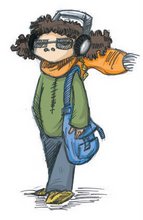It is the symbolic name of the best Discowrld novel, in my opinion. Or maybe the name is symbolic because we, humans, crave to find symbolism in every shred of written word. Because this symbolism is the very Small God we praise.
Terry Pratchett is, above everything else, a keen observer. He's not a talented writer, or cynic journalist, or moralist. Observer. Of human nature, of human thoughts, of human behavior, of all that is human. And he details the results of his prolonged observation in the simples logic way for those who want to observe. That, of course, if you're not too busy laughing your soul out at his solid baseless metaphors.
Small Gods is different, not because of it's sensitive subject. It's different because Pratchett projected himself in this book. I don't want to idealize the man, but then again, his projection is far from being idealistic. He projected himself and spoke his mind, instead as merely suggesting, as he did in all the other novel. He spoke his feeling, pointed the finger, cried of despair, demolished so he can rebuild, destroyed so he can recreate, and... resumed his silent observation. The ever same result he gets, we get, I get, when trying to change a speck of dust.


|